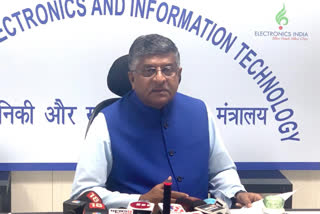New Delhi:Union Minister for Electronics & IT, Communications, Law and Justice Ravi Shankar Prasad said that PLI( Production Linked Incentive) scheme has been a huge success in terms of the applications received from Global as well as Domestic Mobile Phone manufacturing companies and electronic components manufacturers.
22 National and Global companies apply for PLI, huge success for India: Ravi Shankar Prasad He further said that “We are optimistic and looking forward to building a strong ecosystem across the value chain and integrating with the global value chains, thereby strengthening the electronics manufacturing ecosystem in the country”.
Also read: 13 die after consuming sanitiser in Andhra's Prakasam district
Production Linked Incentive Scheme (PLI) for Large Scale Electronics Manufacturing was notified on 1st April 2020.
PLI Scheme extends an incentive of 4% to 6% on incremental sales (over a base year) of goods under target segments that are manufactured in India to eligible companies, for a period of five years subsequent to the base year (FY2019-20). The scheme was open for filing applications till July 31, 2030. Incentives are applicable under the scheme from August 1, 2020.
A total of 22 companies have filed their application under the PLI Scheme.
The international mobile phone manufacturing companies that have applied under Mobile Phone (Invoice Value INR 15,000 and above) Segment are Samsung, Foxconn Hon Hai, Rising Star, Wistron and Pegatron. Out of these, 3 companies namely Foxconn Hon Hai, Wistron and Pegatron are contract manufacturers for Apple iPhones. Apple (37%) and Samsung (22%) together account for nearly 60% of global sales revenue of mobile phones and this scheme is expected to increase their manufacturing base manifold in the country.
Under Mobile Phone (Domestic Companies) Segment, Indian companies including Lava, Dixon Technologies, Bhagwati (Micromax), Padget Electronics, Sojo Manufacturing Services and Optiemus Electronics have applied under the scheme.
These companies are expected to expand their manufacturing operations in a significant manner and grow into national champion companies in mobile phone production.
10 companies have filed applications under the Specified Electronic Components Segment which include AT&S, Ascent Circuits, Vision, Walsin, Sahasra, Vitesco and Neolync.
Over the next 5 years, the Scheme is expected to lead to the total production of about INR 11,50,000 crore (INR 11.5 lakh crore). Out of the total production, companies under Mobile Phone (Invoice Value INR 15,000 and above) segment have proposed production of over INR 9,00,000 crore. The companies under Mobile Phone (Domestic Companies) segment have proposed production of about INR 2,00,000 crore and those under Specified Electronic Components segment have proposed a production of over INR 45,000 crore, Ravi Shankar Prasad informed.
The scheme is expected to promote exports significantly. Out of the total production of INR 11,50,000 crore in the next 5 years, more than 60% will be contributed by exports of the order of INR 7,00,000 crore. The scheme will bring additional investment in electronics manufacturing to the tune of INR 11,000 crore.
The scheme will generate approximately 3 lakh direct employment opportunities in the next 5 years along with the creation of additional indirect employment of nearly 3 times the direct employment. Domestic Value Addition is expected to grow from the current 15-20% to 35-40% in the case of Mobile Phones and 45-50% for electronic components.
With the demand for electronics in India expected to grow manifold by 2025, Hon’ble Minister expressed confidence that PLI scheme and other initiatives to promote electronics manufacturing will help in making India a competitive destination for electronics manufacturing and give a boost to Atma Nirbhar Bharat Mission. Creation of domestic champion companies in electronics manufacturing under the Scheme will give a fillip to vocal for local while aiming for global scale.
Also read: Ahmadi Muslims in Pakistan facing persecution: Report
Under the initiatives like the “Digital India” and “Make in India” programmes, India has witnessed a growth in electronics manufacturing in the last five years.
The National Policy on Electronics (NPE) 2019 visions to position India as a global hub for Electronics System Design and Manufacturing (ESDM) by focusing on size and scale, promoting exports and enhancing domestic value addition by creating an enabling environment for the industry to compete globally.
